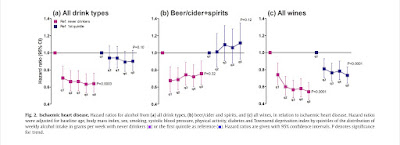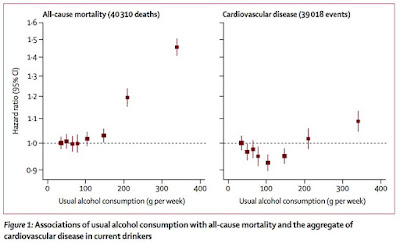There is mounting desperation in 'public health' to debunk the benefits of moderate drinking - or, at least, to make the public think the benefits have been debunked. Various academics are offering their services. It's as if there is a reward on offer to whoever can make the best case against the J-Curve. In a sense there is, because whoever manages it will be set for life in the neo-prohibitionist 'public health' industry.
In recent years, we have seen the J-Curve challenged by ridiculous modelling, lying by omission and the inappropriate use of Mendelian Randomisation. None of this casts serious doubt on the existence of health benefits of moderate alcohol consumption, although the drip-drip effect no doubt leaves the public confused about what the science shows (which is presumably the intention).
Two weeks ago, the gloriously named Beatriz Champagne from the World Heart Federation falsely claimed that any amount of alcohol harms the heart. She said that any claims to the contrary are "at best misinformed and at worst an attempt by the alcohol industry to mislead the public about the danger of their product." I didn't write about this at the time because it was just an assertion with no evidence to back it up.
But then on Friday, a new study was published which claimed to disprove the J-Curve. The study was grossly misrepresented by its own author and was (unsurprisingly) misunderstood by the media.
“The so-called J-shaped curve of the cardiovascular disease-alcohol consumption relationship suggesting health benefit from low to moderate alcohol consumption is the biggest myth since we were told smoking was good for us."
Alcohol - The myth of cardiovascular protection
Our results do not support the current alcohol consumption guidelines for the United Kingdom of up to 14 units per week in relation to CV risk in the general population.
Never drinkers were older (P < 0.0001), had a higher body mass index (P < 0.0001), higher systolic and diastolic blood pressure (both P < 0.0001), were less physically active (P < 0.0001), had a higher prevalence of diabetes (P < 0.0001) and higher incidence of overall CV events (P < 0.0001), ischaemic heart disease (P < 0.0001) and cerebrovascular disease events (P < 0.0001). The incidence of overall CV events, ischaemic heart disease and cerebrovascular disease were comparable between never drinkers and drinkers consuming more than 14 units per week.
Compared to current drinkers in adjusted models, never drinkers were at higher risk for overall CV events (hazard ratio, 1.31; 95% confidence interval, 1.20-1.42; P < 0.0001), ischaemic heart disease (hazard ratio, 1.51; 95% confidence interval, 1.29-1.76; P < 0.0001) and cerebrovascular disease (hazard ratio, 1.46; 95% confidence interval, 1.14-1.87; P < 0.0001). Consequently, using never drinkers as reference resulted in alcohol from all drink types combined exhibiting protection in relation to all outcome measures...
As you can see, the drinkers have a lower risk of ischaemic heart disease at every level of consumption. For wine, the risk drops as people drink more, but for beer, cider and spirits (which are grouped together for some reason) the benefits decline somewhat as people drink more (although none of the changes are statistically significant).
In short, the authors are making some pretty extreme claims about moderate drinking without looking at the only reference group that matters (non-drinkers - or never-drinkers). They effectively use light drinkers as the control. And even then, they barely achieve their desired result.
We’ve seen this trick performed before in a study from 2018 which made similar claims by comparing light drinkers to moderate and heavy drinkers - and generated similar headlines. The graph used in the main body of that study appeared to show no evidence of a J-Curve...





No comments:
Post a Comment